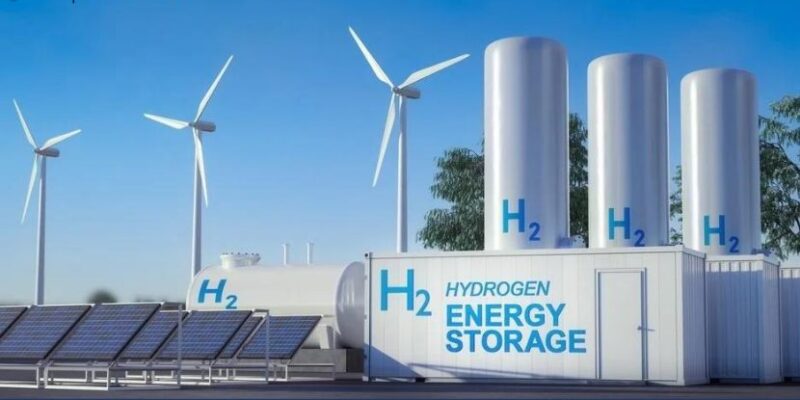
Hydrogen Energy Storage Market Outlook
According to the report by Expert Market Research (EMR), the global hydrogen energy storage market size reached a valuation of USD 17.95 billion in 2023. Driven by the increasing emphasis on renewable energy solutions and advancements in hydrogen storage technologies, the market is expected to expand significantly, with a projected compound annual growth rate (CAGR) of 5.60% from 2024 to 2032, reaching an estimated value of USD 29.28 billion by 2032.
Hydrogen energy storage is a pivotal technology for the transition to a sustainable energy future. It involves the storage of hydrogen gas in various forms, including compressed, liquid, and solid-state, to be used as an energy carrier. This technology plays a crucial role in balancing the intermittent nature of renewable energy sources like wind and solar by storing excess energy and providing it during periods of high demand or low generation.
Key Market Drivers
The primary driver of the global hydrogen energy storage market is the growing focus on decarbonization and the shift towards renewable energy sources. As countries and corporations strive to meet ambitious climate goals and reduce greenhouse gas emissions, hydrogen energy storage offers a viable solution for addressing the challenges associated with the integration of renewable energy into the grid. By storing surplus energy generated from renewable sources, hydrogen energy storage systems help stabilize the grid and ensure a consistent energy supply.
The increasing investments in hydrogen infrastructure and technology development are also propelling market growth. Governments and private entities worldwide are investing heavily in hydrogen production, storage, and distribution projects. These investments are aimed at advancing hydrogen storage technologies, reducing costs, and scaling up production capacities. The development of large-scale hydrogen storage facilities and the establishment of hydrogen refueling networks are crucial for facilitating the widespread adoption of hydrogen energy.
Moreover, the rising demand for clean transportation solutions is driving the hydrogen energy storage market. Hydrogen fuel cell vehicles (FCVs) are emerging as a key alternative to conventional internal combustion engine vehicles, offering zero-emission transportation with longer ranges and shorter refueling times. The growth of the hydrogen-powered vehicle market is creating a need for efficient and cost-effective hydrogen storage solutions to support the deployment of FCVs and hydrogen refueling infrastructure.
Get a Free Sample Report with Table of Contents: https://www.expertmarketresearch.com/reports/hydrogen-energy-storage-market/requestsample
Technological Advancements
Technological advancements in hydrogen storage are a significant factor contributing to the market’s expansion. Innovations in hydrogen storage technologies are focused on improving storage density, safety, and cost-effectiveness. Key advancements include:
- Compressed Hydrogen Storage: This method involves storing hydrogen gas at high pressures, typically ranging from 350 to 700 bar. Recent advancements in materials and design have enhanced the safety and efficiency of compressed hydrogen storage tanks, making them suitable for various applications, including automotive and stationary storage.
- Liquid Hydrogen Storage: Liquid hydrogen is stored at extremely low temperatures (around -253°C or -423°F). The development of advanced cryogenic tanks and insulation materials has improved the efficiency and cost-effectiveness of liquid hydrogen storage, making it a viable option for large-scale storage and transportation.
- Solid-State Hydrogen Storage: Solid-state storage involves the use of hydrogen-absorbing materials, such as metal hydrides and chemical hydrides, to store hydrogen in a solid form. Recent innovations in high-capacity hydride materials and lightweight composites are enhancing the performance of solid-state storage systems, making them suitable for various applications, including portable and stationary energy storage.
- Chemical Hydrogen Storage: Chemical hydrogen storage utilizes chemical compounds, such as ammonia or liquid organic hydrogen carriers (LOHCs), to store hydrogen. Advances in chemical hydrogen storage technologies are focusing on improving the efficiency of hydrogen release and absorption, as well as optimizing the chemical processes involved.
Read Full Report with Table of Contents: https://www.expertmarketresearch.com/reports/hydrogen-energy-storage-market
Hydrogen Energy Storage Market Segmentation
The market can be divided based on technology, physical state, end use, application, and region.
Market Breakup by Technology
- Compression
- Liquefaction
- Material Based
Market Breakup by Physical State
- Solid
- Liquid
- Gas
Market Breakup by End Use
- Residential
- Commercial
- Industrial
Market Breakup by Application
- Stationary Power
- Transportation
- Others
Market Breakup by Region
- North America
- Europe
- Asia Pacific
- Latin America
- Middle East and Africa
Competitive Landscape
The EMR report looks into the market shares, plant turnarounds, capacities, investments, and mergers and acquisitions, among other major developments, of the leading companies operating in the global hydrogen energy storage market. Some of the major players explored in the report by Expert Market Research are as follows:
- Linde plc
- Air Products Inc.
- ITM Power plc
- Dufresne Private Ltd
- Worthington Industries, Inc.
- Chart Industries, Inc.
- Others
Challenges and Opportunities
Despite its promising growth prospects, the hydrogen energy storage market faces several challenges:
- Cost: The high cost of hydrogen storage technologies remains a significant barrier to widespread adoption. While advancements in technology are driving down costs, hydrogen storage systems still require substantial investment. Continued research and development, as well as economies of scale, are needed to reduce costs and make hydrogen storage more competitive.
- Infrastructure Development: The development of hydrogen storage infrastructure, including refueling stations and distribution networks, is crucial for supporting the growth of the hydrogen economy. Coordinated efforts between governments, industry stakeholders, and technology providers are needed to establish a robust hydrogen infrastructure.
- Safety and Regulations: Ensuring the safety of hydrogen storage systems and addressing regulatory challenges are essential for market growth. Implementing stringent safety standards, conducting thorough risk assessments, and developing regulatory frameworks are critical for ensuring the safe and efficient use of hydrogen energy storage.
Despite these challenges, the hydrogen energy storage market presents numerous opportunities for growth and innovation. The increasing focus on clean energy, advancements in hydrogen storage technologies, and supportive government policies are creating a favorable environment for market expansion. Companies that can offer innovative, cost-effective, and scalable hydrogen storage solutions are well-positioned to capitalize on the growing demand for hydrogen energy.
Future Outlook
The global hydrogen energy storage market is poised for substantial growth in the coming years, driven by the need for sustainable energy solutions, technological advancements, and increasing investments in hydrogen infrastructure. As the world transitions to a low-carbon energy future, hydrogen energy storage will play a crucial role in supporting renewable energy integration, enhancing energy security, and reducing greenhouse gas emissions.
The ongoing advancements in hydrogen storage technologies, coupled with supportive government policies and investment in infrastructure, are expected to drive the market’s expansion. Companies that focus on innovation, cost reduction, and scalability will be key players in shaping the future of the hydrogen energy storage market.
With the global emphasis on decarbonization and the transition to renewable energy, the hydrogen energy storage market offers significant opportunities for stakeholders across the value chain. As the industry evolves, hydrogen energy storage is set to become a cornerstone of the global energy landscape, supporting a cleaner, more sustainable future.
Media Contact:
Company Name: Claight Corporation
Contact Person: George buttler, Corporate Sales Specialist – U.S.A.
Email: sales@expertmarketresearch.com
Toll Free Number: +1-415-325-5166 | +44-702-402-5790
Address: 30 North Gould Street, Sheridan, WY 82801, USA
Website: http://www.expertmarketresearch.com
Aus Site: https://www.expertmarketresearch.com.au









